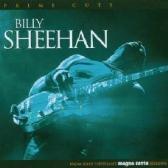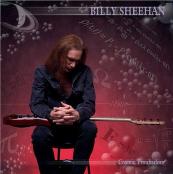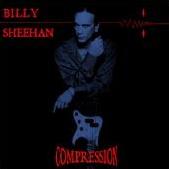

BILLY SHEEHAN
"Prime
Cuts" (Magna Carta; 2006)![]()

Reviewed by Christopher J. Kelter



![]()
Like all albums in the “Prime Cuts” series,
the Billy Sheehan version features a selection of tracks cut from the work Sheehan has participated
in for the Magna Carta label. Billy Sheehan’s “Prime Cuts” features tracks from his work for the label as a leader (Niacin,
Bozzio/Sheehan) and as a participant/sideman (Explorers Club, Jordan Rudess, “Working Man:
Tribute to Rush”).
Sheehan, widely known for his work with Talas and David Lee Roth, has kept busy over the years in a variety of musical projects
that clearly demonstrate his chops and talent. Niacin has been his main and major
project over the past decade – Niacin is represented on four of the ten tracks on “Prime Cuts” and the four tracks come from four separate
Niacin releases. Without a doubt, Niacin is as talented a trio as you can get –
and the superb talents of drummer Dennis Chambers and organist John Novello only accentuate Sheehan’s wealth of skills. Of the four tracks,
the live version of “Clean Up Crew/Do A Little Dirty Work” is most impressive.
Sheehan’s efforts with Explorers Club and Jordan Rudess show off his talents in more progressive settings and in a much more
complementary manner as he is not the primary musical force in the two tracks (“Time
Enough” and “Crack the Meter” respectfully). At the very least the inclusion of these tracks on “Prime Cuts” was enough to make me realize
the fact that Sheehan played on those two albums.
Although I was initially impressed the Bozzio/Sheehan effort “Nine Short Stories” the disc never made it back into my disc player.
However, re-listening to “Sub Continent” in light of the broad scope of styles on
“Prime Cuts” has given me reason enough to reconsider Sheehan’s efforts on
that project. The attempt would be to fully realize and fully appreciate the skills Sheehan
presents on the more ambient/mellow Bozzio/Sheehan project.
As a contributor to one tribute album represented on this collection, it is only fitting that Sheehan lend his skills to an album paying tribute to one of the more other recognizable bassists in recent rock history: Rush’s Geddy Lee. Even though the track features a veritable progressive rock’s “who’s who” it is still easy to hear Sheehan’s talents covering Rush’s “The Trees.” Sheehan’s performance, although a tad understated and respectfully restrained, is essentially his bass guitar performing both Lee’s bass lines and Lifeson’s guitar parts – impressive.
The disc ends with a previously unreleased bass solo recorded in 1994 – this track, a bootleg no less (albeit a decent recording), sheds some light on the primal force that Sheehan is on the bass.
Finally, the liner notes are stellar – both insightful and enlightening while entertaining the reader.
Billy Sheehan’s “Prime Cuts” features a wealth of musical talent including, but not limited to, Mike Baker, Terry Bozzio, Dennis Chambers, Trent Gardner, Steve Howe, Chris Ingles, Steve Morse, James Murphy, John Novello, Mike Portnoy, Jordan Rudess, and Gary Wehrkamp.
For more information visit http://www.billysheehan.com.
"Cosmic
Troubadour" (Favored Nations; 2005)![]()

Reviewed by Ray Van Horn Jr.



![]()
One of the more under appreciated roles in music,
the bassist is primarily a band fundamentalist, often the unheralded backbone, seldom flashy. In modern rock music, particularly hard rock and metal, a handful of extraordinary bassists flock to mind: Steve Harris of Iron Maiden, Geddy Lee of Rush, Flea of the Chili Peppers, Ryan Martinie of Mudvayne, the late Cliff Burton of Metallica, and of course, Mr. Happy Fingers himself, Billy Sheehan. Known for his high-flying bass antics in Talas, David Lee Roth and Mr. Big, Sheehan is Steve
Vai's two-hand-tapping doppelganger on bass. Having played with Vai in Roth's band,
Sheehan's proficiency has naturally grown stronger over the years by association, and it should be no surprise to anyone
familiar with his work that Billy has of late sought out a solo career. Following his mesmeric 2001 release,
"Compression," Billy Sheehan impresses yet again with his latest bass-driven voyage,
"Cosmic Troubadour."
Billy's alliance with Glenn Hughes seems to have rubbed off on him as the opening jam,
"Toss it On the Flame" wastes no time getting the motors revved with rapid picking and vocals that reflect
Hughes' lower octaves. Meanwhile, Sheehan demonstrates that his flair for the bass extends to six and twelve string baritone electric guitars, given the gorgeous, celestial solo on
"Flame."
As one might expect with Billy's deep knowledge of music, his songs are layered heavily with instrumentation, as evidenced on
"Back in the Day." His arrangements indicate a math metal mentality, further hinted by the cover art, which depicts Billy surrounded by hovering, translucent equations. While many artists find the need to rebuff the tag
"math metal," Billy seems entirely comfortable with it. Sample the lush instrumentals
"This Business is Killing Me," "Saj" and "Don't Look Down" to discover how submerged into his craft Sheehan is. The latter is a hard rock funk blast that nearly rocks the tar off of Joe
Satriani's pivotal "Satch Boogie."
With partners-in-crime Ray Luzier on drums and Simone Sello providing extra guitar licks and programming, Sheehan freefalls in his playing, such as his effortless scale-spelunking on the groovy
"From the Backseat." The only weakness of the entire project lies on this song, where Sheehan forces his
"whoa-oh-oh" vocal lines strenuously, but with the astronomical caliber of his playing, this is an entirely forgivable detriment.
Meanwhile, "Dig a Hole" will please Zep-heads with classic rock-based riffs guiding his streetwise verse chords and gratifyingly grimy notes. In contrast, Billy accelerates his playing in response to the rocksteady turbo drive of
"The Lift," if one can imagine such a proposal. To dispel any further doubt, he tops his alacrity on
"The Lift" on breakaway sections of the ensuing prog-rock-oriented song, "A Tower in the
Sky." He gives the listener a small break on the slick jazz-fused "Long Walk
Home," which is sure to please music purists of all sorts, before busting loose again on the gravity-defying instrumental
"Indisputable Truth." Finally, Sheehan shows his tender side on the sentimental
"Hope" and bonus track "A Million Tears Ago."
For those of you captivated by Billy Sheehan's still oft-discussed whirling bass lines on the opening canto to Mr.
Big's "Addicted to That Rush," strap yourselves in for a serious thrill ride on Cosmic Troubadour.
There's a reason Billy was in high demand in the late eighties, most assuredly. With Chris
Caffery's superb Faces/Goddamn War already making a statement for the resurgence of fretmaster freebird artistry, Billy
Sheehan's timing is dead on. As he is master at making his bass sing like an operatic low-rider guitar,
"Cosmic Troubadour," as the name implies, is a wayward journey to another plane, one taken on courses of varying speeds, and one that is nearly unbearable to accept its conclusion.
"Compression"
(Favored Nations; 2001)![]()

Reviewed by Christopher J. Kelter



It goes without saying that Billy Sheehan is a legend. The kind of legend that only virtuosity and numerous appearances on stellar songs brings. Sheehan's bass work has graced the work of Talas, David Lee Roth's solo career, Mr. Big, Niacin, and other numerous guest appearances on other artists' albums. I can't recall whether or not Sheehan has released any other solo efforts – not that it matters. The focus here is on his 2001 release "Compression."
"Compression" features eleven tracks of a sturdy mix of hard rock and a surprisingly unexpected dose of soul. A touch of progressive hard rock can be heard throughout "Compression" but it isn't the kind of prog'd out madness you might expect from bands like Dream Theater or Shadow Gallery. Rather it is the progressive style of a bass virtuoso allowing his creative and technical skills dictate the songs' direction. Sheehan's bass playing on "Compression" seems pretty true to what we've heard from him all these years. Perhaps there is a looser, groovier feel to his playing which is always a good thing.
It must be noted that Sheehan does not go overboard on his bass playing, something he easily could have taken advantage of with the extra freedom of doing his own album. Additionally, Sheehan handles all the vocals and pretty much all of the drum programming and guitars. So it's nice to hear Sheehan get an all-out effort to show of a lot of his musical skills. It must be pointed out that the track immediately following a guest appearance by oft fellow band member, friend, and killer guitar virtuoso Steve Vai is called "Perfect Groove" and displays Sheehan's six-string skills in all its glory. Granted, Vai doesn't have to worry about Sheehan shooing Vai out of his rightful place as a guitar hero, but Sheehan guitar soloing is fairly impressive nonetheless.
I guess a good reference point for "Compression" would be King's X. Come to think of it Sheehan's vocals come across as a more gruff, less soulful version of Doug Pinnick.
I was fully expecting to be completely underwhelmed by "Compression," but, in the end, I'm mildly surprised at Sheehan's solid solo outing.
"Compression" was produced by Pat Regan. The production is solid enough, but lacks a certain level of dynamics and clarity I would have expected from this kind of release.
Billy Sheehan handled all vocals, guitar, bass, and drum programming. Sheehan was assisted by Steve Vai for one guitar solo, Terry Bozzio on drums for three tracks, and Simone Sello on a variety of instruments.
For more information visit http://www.billysheehan.com/.
Rating Guide:



 A classic. This record will kick your ass.
A classic. This record will kick your ass.


 Killer. Not a classic but it will rock your world.
Killer. Not a classic but it will rock your world.

 So-so. You've heard better.
So-so. You've heard better.
 Pretty bad. Might make a nice coaster.
Pretty bad. Might make a nice coaster.
![]() Self explanatory. Just the sight of the cover makes you wanna hurl.
Self explanatory. Just the sight of the cover makes you wanna hurl.
Copyright © 2007 by R. Scott Bolton. All rights
reserved.
Revised: 01 Apr 2024 11:14:15 -0500.